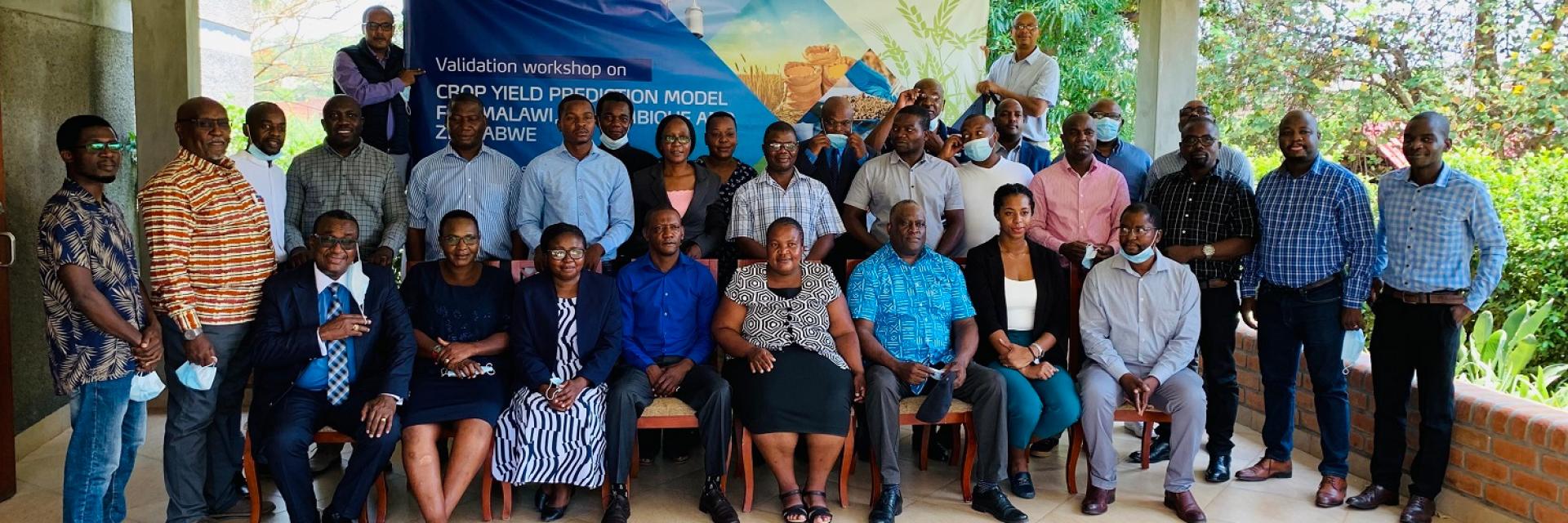Lilongwe, Malawi, 24 November 2021 - In 2019, Tropical Cyclones Idai and Kenneth devastated the Southern African region. Mozambique, Malawi and Zimbabwe were the hardest hit as they bore the heaviest brunt with fatalities, damages and destruction of property, settlements, energy infrastructure, agricultural crops, livestock, forestry, fisheries and wildlife caused by the intense flooding and severe winds associated with the Cyclones.
This week in the Malawian capital of Lilongwe, the ACPC is organising a workshop to validate a crop capability mapping tool developed to enhance the forecasting capacities of relevant sectors in the three countries. Among the core purposes of the validation workshop is incorporating input from key stakeholders in Mozambique, Malawi and Zimbabwe on how the tool can be strengthened and packaged for uptake and use by stakeholders.
The devastation wrought on the three countries in the eye of the storm prompted high-level intervention to prepare for disasters and forestall livelihood losses in future. The response saw the continent’s lead climate think-tank, the African Climate Policy Centre (ACPC) of the United Nations Economic Commission for Africa (UNECA) approached to lead in preparing the affected countries to facilitate the uptake of an effective and comprehensive multi-hazard early warning early action system.
According to Dr James Murombedzi who heads the ACPC, the cyclones that pummelled the region triggered the convening of a “Building Back Better” workshop in late 2019 in concert with the governments of Malawi, Mozambique and Zimbabwe with a view to assist them to integrate climate information services in their reconstruction plans. “The core outcome of the Building Back Better workshop was a request to ACPC to develop a study to demonstrate how investments in climate information services in the agriculture sector could contribute to building resilience of the sector to extreme, high impact climate events.” Murombedzi recalls.
The ACPC implemented the request and successfully demonstrated the Socio-Economic Benefits (SEB) of Climate Information Services to Disaster Risk Reduction. According to Murombedzi, ACPC commissioned a study to extend this model from the disaster risk reduction sector (DRR) to agriculture, focusing on Zimbabwe, with the intention of replicating the intensive studies to Malawi and Mozambique. Murombedzi says the study culminated in a report titled “Socio-Economic Benefits of Climate Information Services for Zimbabwe Agriculture” which explored how the southern African country can benefit from an early warning and early action system based on the available climate information services.
“The outcomes of the ‘Building Back Better’ reconstruction workshop followed by the Zimbabwean case study offered useful insights that compelled the ACPC to launch a second phase evidence-based study seeking to develop seasonal crop capability maps for the agriculture sectors of Mozambique, Malawi and Zimbabwe.” Murombedzi says. “This initiative has now developed a tool for agriculture policy makers in the three countries to translate the seasonal and sub-seasonal forecasts, which tend to be cast in very general terms, into specific maps detailing the implications for crop production in specific agro-ecological zones of their countries.”
The three-day Lilongwe workshop amalgamates the milestones since 2019 and combines with the ACPC-led study which seeks to enhance climate forecasting capacities through a training programme in the select countries to better inform adaptation and resilience in agriculture and other climate sensitive sectors.
Mr Murombedzi says the Lilongwe validation workshop signifies the completion of the study and is organised to validate the study’s findings and make recommendations for uptake and use of the crop capability modelling tool by policy makers at all levels.
Mr Frank Rutabingwa of the ACPC acknowledges that the aims of the study were geared towards improving the forecasting and information interpretation capacities of policymakers and user communities for strategic provisioning of appropriate inputs to the agriculture and food security sectors.
“Despite rapid technological progress in the generation of climate information services, much of the weather and agro-meteorological information is not used by small-holder farmers. There is need to develop a series of simple and robust scientific tools, methods, and services that can guide planning and policy to better understand climate impacts on food security and livelihoods.” Rutabingwa says. “The interface between scientists who generate products and end-users is essential for achieving optimum agricultural productivity on seasonal and long-term basis. Thus, climate information services in agriculture needs to integrate feedback and inputs from agricultural support services, institutions, suppliers, local cooperatives or community-based organizations in order to help farmers to make practical, feasible and relevant decisions.”
According to Rutabingwa embedded goals include recommendations on enhancing the capacity for improved production, better access and sustainable operations for climate information service as well as the development of a methodology for predicting crop capability in the various agro-ecological and rainfall zones in order to enrich agricultural productivity and food security.
The Lilongwe workshop continues ACPC’s core objective of cementing climate information services in the continent’s agriculture sector, with the aim of providing a full range of advisories regarding climate and its impacts on crops, livestock, fisheries and management practices to build resilience. ACPC studies show that well-tailored information assists stakeholders in making management decisions to reduce the risks and benefit from opportunities available in a changing climate.
Issued by:
Communications Section
Economic Commission for Africa
PO Box 3001
Addis Ababa
Ethiopia
Tel: +251 11 551 5826
E-mail: eca-info@un.org

